Music Unites People | How It Bridges Cultures and Generations
Music is more than sound; it transcends words, borders, and time. From African drumbeats to Indian classical melodies, from folk tunes to modern pop, it brings people together. Across cultures and generations, music connects souls and links the past, present, and future. Music unites people, creating shared experiences that words alone cannot express. It evokes emotions, sparks memories, and fosters understanding between strangers. Every note, rhythm, and harmony has the power to inspire, comfort, and energize, making us feel part of something greater than ourselves.
Whether through a lively festival, a quiet song, or a global collaboration, music builds bridges and strengthens bonds, reminding us of our shared humanity. It allows people from different backgrounds to celebrate, mourn, dance, or reflect together. In families, communities, and even across continents, music creates moments of unity that transcend age and language. It carries stories, traditions, and emotions from one generation to the next, keeping cultures alive while embracing innovation. Truly, music unites people, proving that the language of melody is one everyone can understand.

Music | The Universal Language of Humanity
The beauty of music is its universality. Even without understanding the words, a melody can spark joy, nostalgia, or excitement anywhere. A child in Japan might smile at the same tune that makes a family in Brazil tap their feet, showing how music transcends borders. Moreover, it expresses what words often cannot. Its rhythm mirrors the heartbeat, its harmonies reflect human emotion, and its melodies carry stories we all understand. In this way, music becomes a language without translation, connecting people at the deepest level.
Across continents and generations, music creates shared experiences that bring strangers together and spark conversation. A single song can evoke memories, emotions, and understanding, reminding us that, despite differences, we all respond to rhythm, melody, and feeling in the same human way.

Cultural Diversity Expressed Through Music
Every culture brings its unique flavor to the world of music, yet these cultural expressions often intersect, blend, and inspire one another. Jazz, for example, is a musical genre born from African rhythms and European harmonics in the United States. Over time, it has traveled globally, influencing musicians and listeners in places as far-flung as Japan, France, and South Africa. Similarly, genres like reggae, flamenco, and K-pop reflect the rich cultural heritage of their regions while captivating audiences worldwide.
Collaborations between artists of different backgrounds highlight this beautifully. When a Western pop singer collaborates with an Indian classical musician or a Latin American band fuses reggaeton with African drums, it demonstrates how music can transcend cultural boundaries and create a shared experience for diverse audiences. Festivals, cultural exchanges, and global music events serve as platforms for these interactions, fostering respect, understanding, and appreciation for traditions beyond one’s own.

Music Unites People Across Generations
Music not only connects different cultures—it also unites generations. A song that once filled the radio in the 1960s might now be rediscovered by teenagers through streaming platforms, creating a shared musical experience that spans decades. Older generations carry memories and stories tied to specific songs, while younger audiences bring fresh perspectives and new interpretations.
Family gatherings often highlight this intergenerational bond. Parents might introduce their children to songs that shaped their youth, while teenagers share contemporary hits with grandparents. This exchange not only cultivates understanding but also ensures that musical traditions, genres, and iconic songs are passed down, keeping cultural heritage alive while welcoming new creativity.
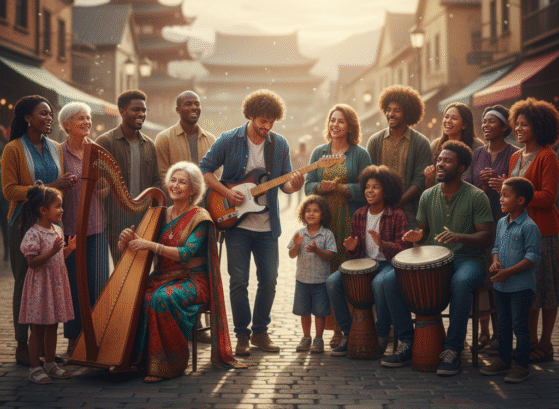
Music Unites People in Live Experiences
Live music amplifies the sense of connection in ways recorded music cannot. When people gather for a concert, a festival, or even a community sing-along, they experience something collectively powerful. The energy of the crowd, the shared anticipation, and the emotional highs and lows create an invisible bond among attendees.
Consider large-scale events like the Glastonbury Festival in the UK, Coachella in the United States, or traditional music festivals in countries like Spain or India. People from different nationalities, ethnicities, and ages come together, united by rhythm and melody. Even without speaking the same language, they sway to the same beats, sing along to the same choruses, and share smiles, laughter, and tears. Music in these moments becomes more than entertainment—it becomes a social glue.
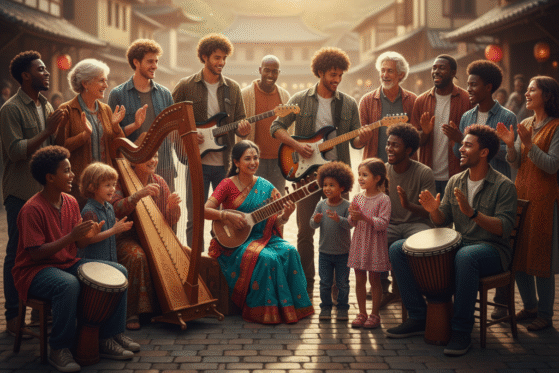
Music in the Digital Age | Boundaries Dissolve
Technology has transformed music into a global phenomenon more accessible than ever before. Streaming services, social media platforms, and virtual concerts allow music to cross borders instantaneously. A folk song from Nigeria can trend in South Korea, a Bollywood soundtrack can find fans in Canada, and classical compositions from Europe can be shared with students in Africa.
The digital age also enables collaborations that were once impossible. Musicians in different continents can create songs together without ever meeting physically, blending styles, instruments, and languages in innovative ways. This instant connectivity reinforces the idea that music is a shared human experience, accessible to all, and capable of creating communities that span the entire globe.
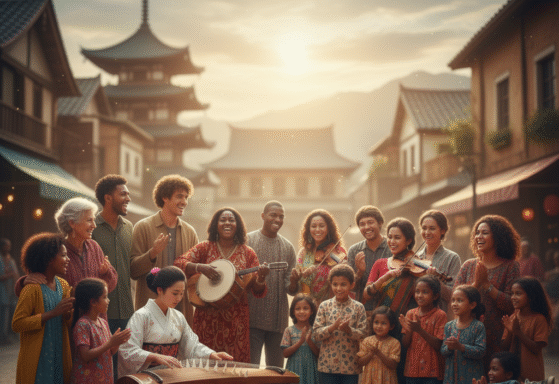
Music Unites People Through Social Change
Throughout history, music has played a vital role in social movements, acting as a unifying force for change. From songs of protest and freedom to anthems of hope, music has rallied communities and strengthened solidarity. For example, the civil rights movement in the United States, the anti-apartheid struggle in South Africa, and global peace campaigns all harnessed music to amplify their message.
These powerful songs carry emotional weight that inspires action, empathy, and understanding. When people raise their voices in protest chants or sing together for a cause, music transforms into a tool for unity. It shows that music can connect people not just for entertainment, but for meaningful social and emotional connection.
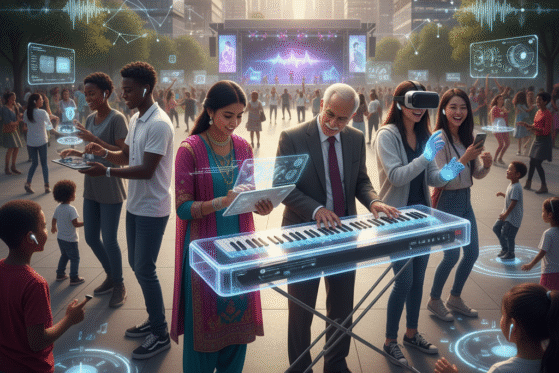
Personal Connections Through Music
On a personal level, music builds connections. Friendships spark over shared playlists or favorite artists, while couples bond through meaningful songs. Families create traditions around music, and strangers often find common ground at concerts. Music Unites People, breaking barriers and creating moments of shared joy and understanding. These small interactions, though seemingly simple, ripple outward, fostering empathy and compassion. Over time, they weave a larger network of human closeness that spans communities, cultures, and generations. Through melodies and rhythms, music not only entertains but also strengthens the invisible bonds that bring people together.
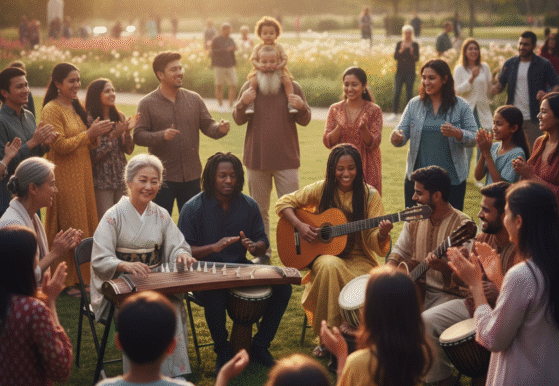
Music’s Role in Healing and Emotional Connection
Beyond celebration, music connects people emotionally and psychologically. It can comfort, inspire, and heal. Music therapy uses melodies to reduce stress and boost well-being. When communities share music in grief or joy, they release emotions together, strengthening bonds across generations and cultures. Music unites people by creating shared experiences that transcend language, age, and background. From family sing-alongs to global concerts, music builds connections that words alone cannot. Its power lies in bringing hearts together, reminding us that we are all part of a larger, harmonious world

Looking Toward a Harmonious Future
The power of music to unite is timeless and universal. Despite differences in language, culture, or age, it connects us through shared emotions. As music evolves, its purpose remains—to unite, express, and connect. With technology and creativity, it continues to bridge divides, foster understanding, and celebrate diversity.
Every note, song, and performance reminds us that we are more alike than different. Through harmony, we can build a world full of connection, empathy, and joy. Programs like The Mystic Keys amplify this power, bringing learners from all walks of life together through music. From beginners discovering their first chords to seasoned performers sharing the stage, music becomes a shared language that transcends age and background. By embracing this universal art, we celebrate both individuality and unity, showing how every melody can create bonds that last a lifetime.
Intersted in learning music with us? Register now
For more information and exciting resources about learning music, visit our website at The Mystic Keys. For more music content and exciting offers follow us on
Facebook, Instagram, YouTube, LinkedIn, Twitter, Pinterest, and Threads.








